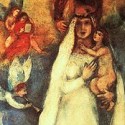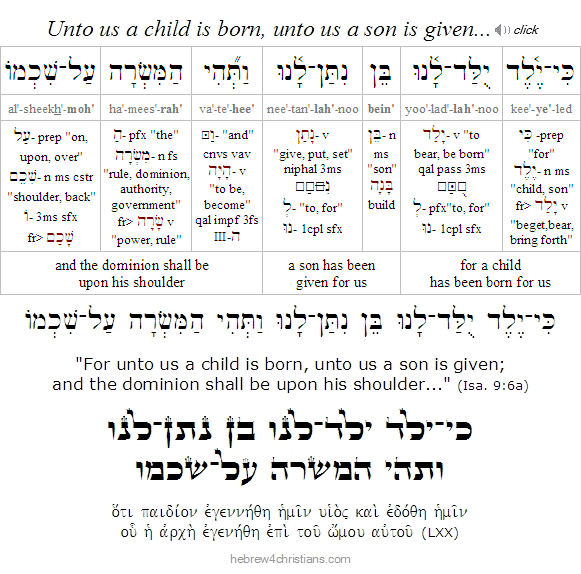|
|
|||||||||||||||||||||
 |
|||||||||||||||||||||
|
Learn Hebrew |
|||||||||||||||||||||
|
|
||||||||||||||||||||||||||||
|
"For unto us a child is born, unto us a son is given..." |
|||||
|
DURING THE DAYS of the divided kingdom, faithless King Ahaz of Judah fearfully anticipated an invasion by Syria and Israel (Isa. 7:1-2). Isaiah reaffirmed that David's kingdom would indeed be established forever and even gave the doubting king a sign: A virgin will bear a son and call him "God with us" (Isa. 7:14). |
|
mi zeh melekh ha-kavod? Adonai izuz v'gibbor, Adonai gibbor milchamah |
|||||||||||
|
Who is this King of glory? The LORD, strong and mighty, the LORD, mighty in battle! Psalm 24:8 |
|||||||||||
|
Now while Jesus is indeed the ultimate fulfillment of the verse, there remains an eschatological dimension: He is not currently ruling and reigning as Israel's King on David's throne, since that will occur after His Second Coming during the Millennial Kingdom. Perhaps that is why the verse says, 1) "unto us a child is born" (the First Advent), and 2) "unto us a son is given" (the Second Advent). At the end of days, when Jesus returns as Israel's King, the Jewish people will comprehend the full meaning of these verses and then "all Israel shall be saved" (Rom. 11:26). |
|||||||||||
|
ūøų╝ų┤ūÖųŠūÖųČū£ųČūō ūÖų╗ū£ų╝ųĘūōųŠū£ųĖūĀūĢų╝ ūæų╝ųĄū¤ ūĀų┤ū¬ų╝ųĘū¤ųŠū£ųĖūĀūĢų╝ kee - ye'┬Ęled ┬Ę yoo┬Ęlad - la'┬Ęnoo ┬Ę bein ┬Ę nee┬Ętan - la'┬Ęnoo "For unto us a child is born, unto us a son is given; |
|
Isaiah 9:6-7 in Hebrew: |
|||||||||||||
![Isaiah 9:5-6[h] BHS](../../Meditations/Yeled/isa9-6-7.gif) |
|||||||||||||
|
For to us a child is born, to us a son is given; and the government shall be upon his shoulder, and his name shall be called Wonderful One, Counselor of the Mighty God, the Father of Eternity, the Prince of Peace.Of the increase of his government and of peace there will be no end, on the throne of David and over his kingdom, to establish it and to uphold it with justice and with righteousness from this time forth and forevermore. The zeal of the LORD of hosts will do this. - Isaiah 9:6-7 |
|||||||||||||
|
Theological Postscript: |
|||||||||||||
|
Many Christians regard this verse as being fulfilled in Jesus, and while this is ultimately true, we need to be careful to make certain qualifications when we affirm this. Some Christian theologies teach that when Jesus ascended to the right hand of God (after His resurrection), He also sat down on the throne of David, and they therefore conclude that the Davidic kingdom has been inaugurated. An implication of this is that the Church is now "spiritual Israel," a spiritual kingdom on earth. But note that Isaiah's prophecy of this promised son says (v7): "Of the increase of his government and of peace there will be no end, on the throne of David and over his kingdom, to establish it and to uphold it with justice and with righteousness from this time forth and forevermore." Behold, the days are coming, declares the LORD, when I will make a new covenant with the house of Israel and the house of Judah, not like the covenant that I made with their fathers on the day when I took them by the hand to bring them out of the land of Egypt, my covenant that they broke, though I was their husband, declares the LORD. But this is the covenant that I will make with the house of Israel after those days, declares the LORD: I will put my law within them, and I will write it on their hearts. And I will be their God, and they shall be my people. And no longer shall each one teach his neighbor and each his brother, saying, 'Know the LORD,' for they shall all know me, from the least of them to the greatest, declares the LORD. For I will forgive their iniquity, and I will remember their sin no more." I have written about this topic before, but suffice it to say here that it is my settled conviction that God has not forsaken the Jewish people, even though there is a "partial hardening" of their hearts until the fulness of the Gentiles is complete (see Romans 11 for the details). Israel indeed has a future and a New Covenant hope, and while Isaiah 9:6-7 gloriously applies to Jesus, the promise has its ultimate fulfillment upon His return to Jerusalem to establish the Messianic Kingdom of God on the earth (Jer. 23:5-6, 33:15; Ezekiel 47:13-48:29, Ezekiel 48:30-35; Acts 1:6-8; Acts 15:14-17, etc.). Like many of the promises we treasure in Scripture, this one too has an "already-not-yet" status... |
|||||||||||||
|
Hebrew for Christians |
|||||||||||||
|
|||||||||||||


